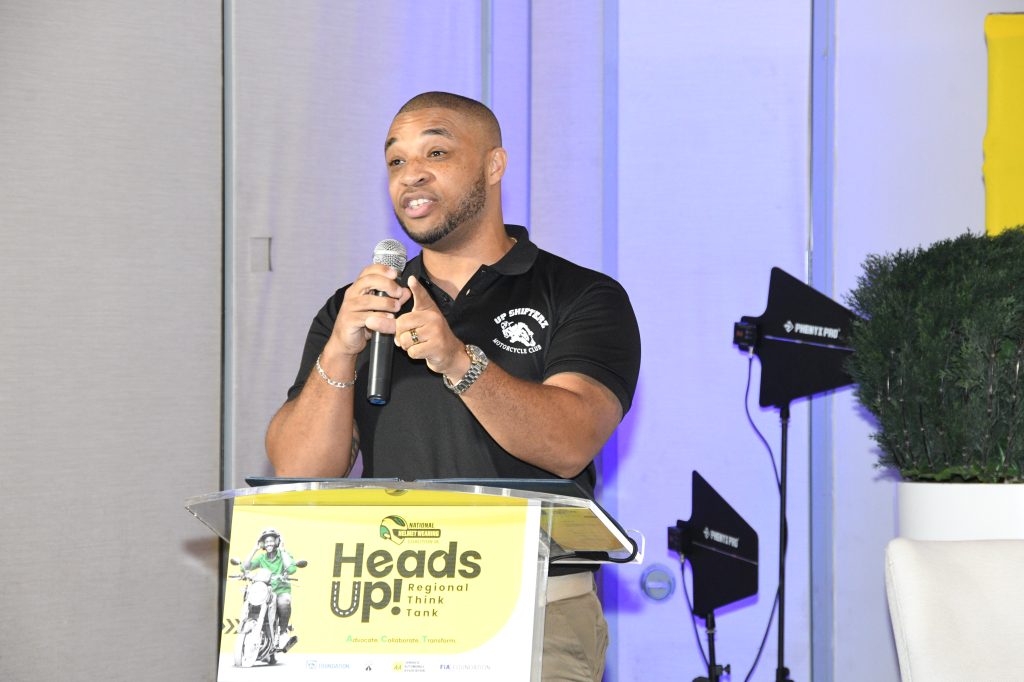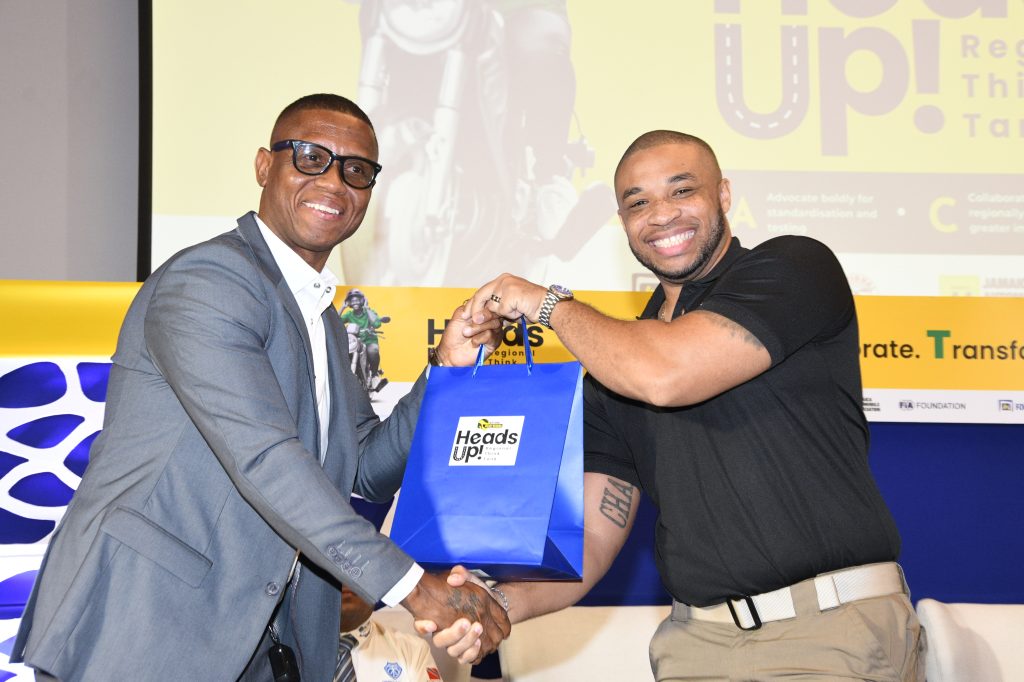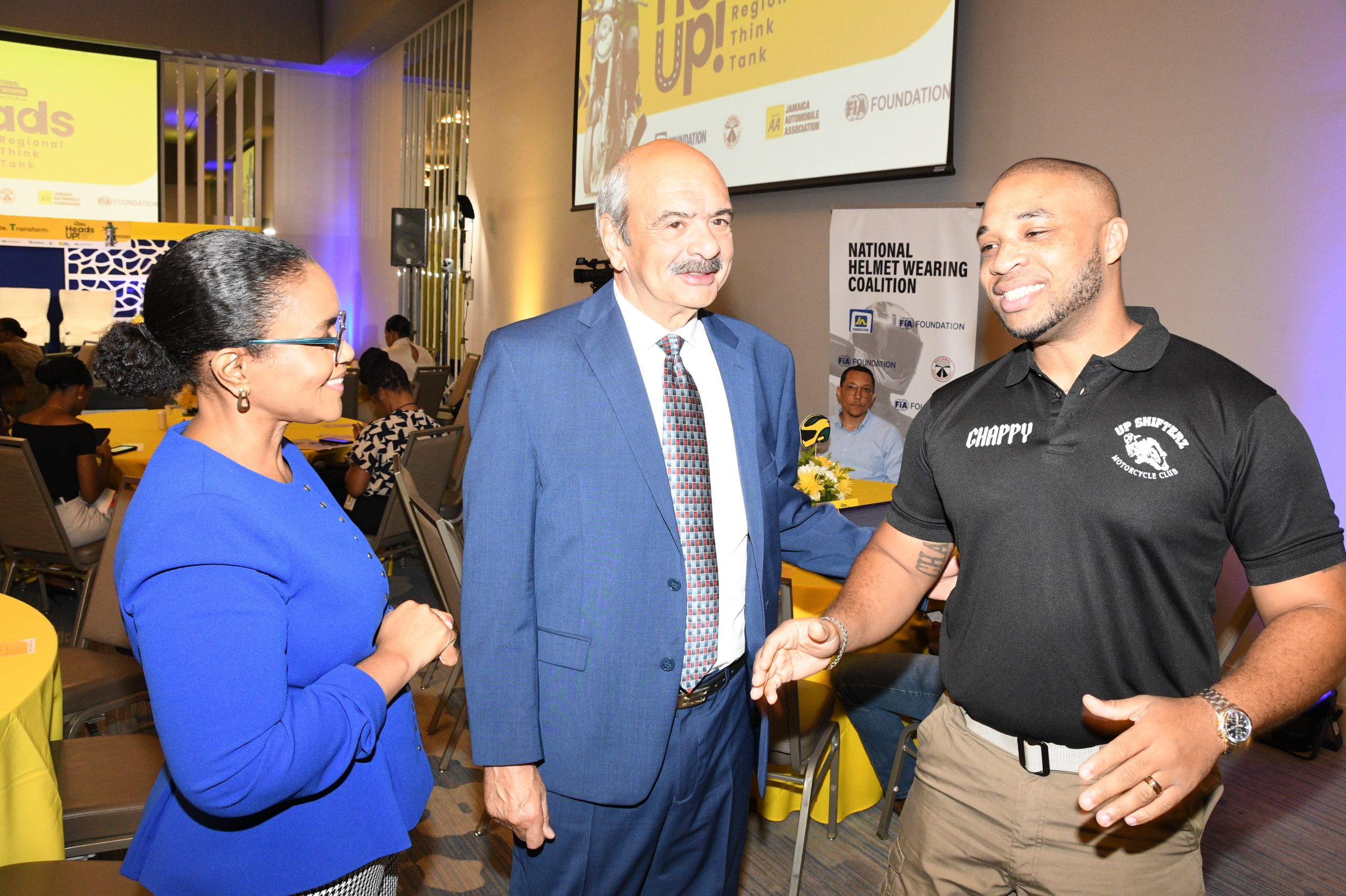Photo Caption: Christopher Atkinson (right), a member of the National Helmet Wearing Coalition, in discussion with Claudine Allen (left), general manager, JN Foundation; and Frank Fotia, president of the FIA Region 3, during the Heads-Up Regional Think Tank on motorcycle helmet safety held at the AC Hotel in Kingston recently.
Christopher Atkinson, a member of the National Helmet Wearing Coalition, is urging stakeholders to leverage the power of personal stories to advance road safety and promote helmet use. Speaking during a panel discussion at the Heads Up Regional Think Tank on motorcycle helmet safety, held at the AC Hotel in New Kingston recently, he underscored the emotional impact of real-life experiences in driving meaningful behaviour change.
He was addressing regional experts, policymakers, road safety advocates, motorcycle drivers, and communication professionals who gathered to explore solutions to the growing crisis of motorcycle-related injuries and fatalities across Jamaica, the Caribbean, and Latin America. The two-day event was hosted by the National Helmet Wearing Coalition, a project of the JN Foundation in collaboration with the National Road Safety Council, funded by the FIA Foundation.
“Motorcycle safety is personal not just procedural. We talk a lot about data, accident rates, helmet usage, traffic laws, but what truly shifts behaviour is emotion. People rarely remember statistics, but they do remember stories, stories that feel real, reflect their lives and make them think that could be me,” he said.
Mr Atkinson noted that although education and enforcement are essential to promoting road safety, they are not sufficient on their own to drive meaningful changes in behaviour and attitudes.
“What we’re missing is emotion because emotion moves people. When we tell real stories about real riders, people pay attention. When a biker shares how he got hit and how a helmet saved him, that sticks. When a mother explains why she made her teenage son wear a helmet every single day, that inspires. The goal is not to scare people but to connect and once that connection is made, they begin to believe in the whys behind the rules,” he emphasised.

“Campaigns that change habits are the ones that show real riders, not models, talking about close calls, their regrets, their good choices, and their bad choices despite pressure. Effective road safety storytelling isn’t created in the boardroom, it comes from the streets, those who are directly or indirectly pounding the pavement on a regular basis. We have to work with communities to build better safety narratives.”
Mr Atkinson encouraged advocates to adopt a more inclusive and community-based approach to storytelling. He recommended hosting story circles or rider forums to gather real experiences that can drive meaningful change and emphasised the importance of including diverse voices such as women riders, delivery bikers, and rural motorcyclists who each bring unique perspectives. He also stressed the value of authenticity by using real people in familiar settings to build trust, and urged collaboration with local influencers, including community leaders, riding groups, and mechanics, who often have greater impact than traditional advertising.
He further highlighted that one common mistake in safety campaigns is portraying danger without acknowledging the dignity of those affected, cautioning that messaging should respect and reflect the lived experiences and resilience of riders.
“Riders aren’t just victims, they’re resilient, resourceful, and proud. We need to start reflecting that. When a campaign shows a delivery rider who wears a helmet because he wants to be there for his children or a young woman biker proudly navigating the city traffic because she believes in her right to mobility, that’s powerful, that’s behaviour change with dignity.”
“We need stories that uplift not just serve as cautionary tales we need stories that show the pride in putting on a helmet, the honour in riding responsibly, the love behind slowing down so you can come home safe. We need stories that show that in every corner of every city or village safety is an act of resilience and resilience is something to celebrate not just survive,” he said.

Also participating in the panel discussion were Dr Lovette Byfield, a public health specialist, consultant, and social and behaviour change expert; Kate Turner, media and advocacy manager at the FIA Foundation; and Selwyn Richard Persaud, director and secretary general, Trinidad & Tobago Automobile Association.
The panel was one of five that provided a platform for dynamic dialogue and policy-orientated solutions to address helmet usage and enforcement. The other panels addressed regional perspectives on helmet use; legislative and regulatory gaps towards regional policy solutions; social and economic impact of motorcycle crashes and fatalities as a barrier to development; and best practices and solutions creating safer motorcycle drivers.




